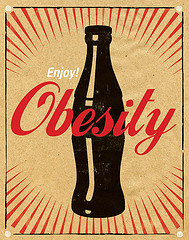Obese & Malnourished

As a dietician working in a bariatric clinic I meet a lot of patients who over eat. This is far from surprising. However, what never fails to astound me is how many of these very same people are malnourished.
It’s easy for the general public to make the connection between malnutrition and starvation in the developing world, but when it comes to overweight Westerners being malnourished it’s a different story.
In the developed world, where obesity has reached epidemic proportions, we are seeing more and more people who are overweight or obese being diagnosed with malnutrition because they consume too much of the wrong foods; foods with little to no nutritional value that are low in protein, vitamins and minerals.
To understand this contradictory situation you must understand the different types of nutrients and how vital they are. This is one of the main reasons why so many Westerners are plagued by chronic diseases.
According to Joanne Slavin, a nutrition professor at the University of Minnesota, the main culprit of malnutrition is usually poor protein.
“If you don’t get enough protein, you might still get enough calories without getting enough nutrients,” says Slavin.
In my experience the main “shortfall” nutrients tend to be calcium, fiber, potassium and vitamin D. Many overweight individuals have packed on extra weight over the years because they have poor diets that are typically high in refined foods. These highly refined foods are high in unhealthy fats and sugars and low in the aforementioned nutrients.
In this age of calorie counting, it’s important to consider all aspects of your diet. But let me tell you, calorie content is not the be all and end all. A calorie from a Mars bar is the same as a calorie from an Apple when it comes to energy exchange, however, an apple is much richer in vitamins and minerals.
As US based nutritional consultant, Carol Cottrill, points out “when we eat the empty calories found in processed foods instead of wholesome, real food, our appetite is curbed temporarily, and our stomachs feel full, though our bodies have not taken in the nutrients they crave. This is the setup for what's known as subclinical malnutrition. Not to be confused with the undernourishment experienced in famine-stricken countries.”
To keep our body healthy, we must fuel it with the necessary ingredients that can only come from a healthy, well-balanced diet. When we don't get nutrients, our internal functions don't work as well - and this is when we become vulnerable to diseases such as obesity.
Image Credit: Melissa Gruntkosky
i think malnutrition is common in obese patients. we tend to eat specific 'craving' foods regardless of their benefits to our bodies.
for ME it was years of processed carbs, fast foods, boxed foods, 'bar' foods, etc. can't imagine there's much good in any of that.
i saw an episode of "Fat Doctor" where a woman had RNY and her intestines were like mush from eating a very specific diet of bread and sausage ONLY. her surgeon felt that it was significant malnutrition due to the diet and was lucky to get the RNY done but had a tough time with it.
I also think that there is something about the disease state of obesity...I took lots of it D and was always deficient until I lost weight.
This was a great article!
It really is difficult for people to understand that even with all the food that is available to us today, that a person could still be malnourished.
The unhealthy choices of food are abundant and often more readily available and cheaper then the healthier alternatives.
Making us both unhealthy and obese at the same time. It's easier to purchase the Mars that is readily available then it is to travel to the supermarket or produce store to purchase the apple.
Very interesting. Well said.
What is even harder is having normal weight and malnutrition.







MaggieAL 8
Posted
Thank you for posting this,...I will take your advise and eat only healthy foods,
Share this comment
Link to comment
Share on other sites